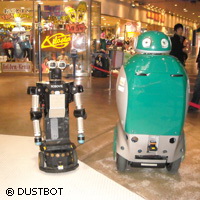DustCart: the rubbish collecting robot
Since 2006, an EU-funded team of researchers has been working on a project that would see an 'on-call' robot collect rubbish from your home without you lifting a finger. Well, perhaps just one finger to make the initial telephone call. For the last few months, the project's prototype robot, known as DustCart, has been servicing around 100 households in the village of Peccioli in Italy. After a series of pilots and demonstrations, the DUSTBOT ('Networked and Cooperating Robots for Urban Hygiene') team expects as many as 100,000 DustCarts to operate in Europe in the not-too-distant future. The project was funded EUR 1.9 million under the 'Information society technologies' (IST) Thematic Area of the EU's Sixth Framework Programme (FP6). Standing at roughly human size, DustCart is clever enough to navigate streets and small alleys, sense obstacles in its path (it avoids collisions with pedestrians by altering its own course), and find its way to your doorstop to remove household waste. For the most part, DustCart performs its task autonomously, but human operators at a control centre that receive images from cameras fitted onto the robot can intervene if an emergency or technical problem arises that DustCart cannot solve. The experts from nine EU institutes that make up the DUSTBOT team have successfully designed, developed and tested a system that will help contribute to cleaner urban environments in Europe and improve the life of European citizens, particularly the elderly and disabled. The robot is part of an EU-funded new generation of state-of-the-art machines intended to perform everyday tasks that may be challenging for some people. The coordinator of the project, Professor Paolo Dario from Scuola Superiore Sant'Anna (SSSA) in Italy, said: 'We've taken the very best and most advanced robotics components to build DustCart, which solves a very real problem for waste authorities across Europe.' Most recently, the team performed nine demonstrations in a number of European countries, Japan and South Korea. Professor Dario explained that in the last four years they have gathered substantial information on the performance of the system and its safety. He added that the 'real-world' trial in Peccioli is an excellent opportunity to assess one of the project's most important elements: customer satisfaction. 'We've had interested from several municipalities, but investors need to know that there is a credible market for the system, that residents will favour the new approach.' Although the project formally concluded in December 2009, SSSA and two other project partners have committed time and resources to further developmental work with a view to a more commercial focus in the near future. 'We have talked to numerous potential investors and could raise several million euro in investment, but there first needs to be more evaluation. If this trial is successful, we will immediately work to raise the cash and hope to begin early development of a commercial system by the end of 2010,' added Professor Dario. According to Professor Dario, the costs of running DustCarts are roughly equivalent to current door-to-door waste and recycling collections. The team also believes the system's waste-collection-on-demand approach is both financially and environmentally attractive.

